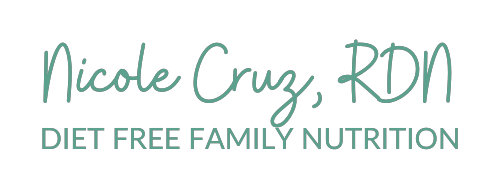Do you ever ask yourself, Am I hungry? But you have no idea the answer.
I remember days on end when I never got a “hunger” signal. My body was basically numb. I didn’t feel much of anything. I was weak, depressed, unable to concentrate, and irritable. But if you asked me if I felt hungry I would have said, “No way!” And the truth is, I didn’t feel hungry at all. I was malnourished and deprived of food, but I didn’t feel any stomach hunger. My signals were gone.
It seems strange that you can lose those signals or the ability to feel them, but you can! Hunger is a sensation, telling your body you need to eat food. And satiety is the sensation of feeling full, the absence of hunger. It sounds simple, but it’s confusing! My clients, family, friends, and the general public (because let’s be honest, food and body talk is EVERYWHERE!), tell me they don’t know when they’re hungry. They don’t know what it feels like, dismiss it because they believe they shouldn’t be, or they miss the subtle signals.
Why don’t I feel hungry all day?
Many people report skipping breakfast or snacks because they don’t feel hungry or they don’t want to eat because it makes them more hungry. The body is quite remarkable and it adapts based on different experiences. If you ignore it’s signals, over time it will stop giving them. Or if you don’t eat at certain times of day, it stops sending out hunger cues during that time. When not eating enough, your metabolism slows down to preserve energy. The digestive system becomes sluggish and dulls the sensations. You also might miss signals if your brain is focused on other activities, such as a big project, or if you’re busy going from one activity to another.
Why do I feel hungry?
There are many hormones involved in hunger and fullness. Epinephrine (adrenaline) mutes the appetite. So during short term stress you will likely not get the signal to eat or you won’t feel like eating. But with prolonged stress and the release of cortisol, the opposite occurs and hunger becomes more extreme. We also have very specific hunger and fullness hormones, grehlin and leptin. The release of leptin decreases hunger and grehlin increases hunger. Your level of these hormones are dependent on your body make up, genetics, and your state of nutrient intake.
Insulin also plays a role in hunger. It’s the hormone responsible for moving glucose (sugar) from the blood into the cells to be used for energy. If your body is resistant to the uptake of insulin, you may be feeling extreme hunger as your body cells are not receiving the energy that’s being consumed. On another note regarding blood sugar, you may feel hungry when your blood sugar drops. This could be when it falls below adequate levels or if it rises and plummets rapidly due to meal composition or an insulin response.
When should I eat?
We talk so much about eating when you’re hungry and stopping when you’re full, but what does that really mean, and is that always the best choice? In my case, I was in a constant state of starvation, completely detached from body cues, and numb from the lack of nutrients. However, I was getting other signals to eat: depression, fatigue, headaches, inability to concentrate, irritability. The body has many ways of telling us when it needs fuel. At times this is by activating the stomach cues. But sometimes we only feel hunger in other parts of our body, such as feeling fatigued, shaky, or light-headed. There are moments when our body cries out for food by shifting our focus to meals and recipes so we can hardly concentrate on anything else.
Hunger and fullness are tricky topics full of nuance and perception. We tend to believe there is a perfect level of hunger and fullness for everyone, but that is not true. There is no universal ideal level, but each individual might feel best at varying degrees. And there are different factors that may play into this comfort level. If you were deprived of food as a child you may like to feel more full in order to be satisfied and feel safe. On the other hand, if you were always forced to finish your plate, you may prefer to feel less full but to eat more often. These preferences may also shift based on activity, season, and emotional state.
What if I’ve lost this connection?
If your body isn’t receiving appropriate signals, try to set some general guidelines to help your body get back to noticing them again.
Eat within an hour of waking. Make a plan to eat something within an hour of waking even if you’re not hungry. This will start to stimulate your body to know food is coming and allow your metabolism to kick in. Try eating every two to three hours (no longer than four), to keep your digestive system stimulated. This is also optimal for keeping blood sugar levels adequate without breaking down other body tissues.
Set a timer for every two hours. If you’ve been missing your hunger signals, set a time to check in. with your body. Do you notice any hunger? Do you feel ready to eat? Notice if you are getting gentle hunger signals. Once you practice doing this more often, it will become a more natural practice.
Keep a hunger and fullness journal. You don’t need to write down your exact food, just your levels of hunger and fullness before and after a meal or snack. If you are having trouble putting a number on it, try to write down the physical feelings you notice in your body. Once you start to know your hunger better, you can experiment with when you feel best eating and stopping. This hunger and fullness scale can help you determine where you might be! (And if you would prefer another version, here’s another option.)
What if I’m not hungry but I want to eat?
Physical hunger is not the only reason we eat. While we want to acknowledge physical hunger and use it as a guide for eating, it’s also normal to eat in response to other types of hunger:
Emotional hunger. Emotional eating has gotten a bad rap, but it isn’t always “bad”. There are many times when emotional hunger provides a wonderful opportunity to eat. We eat for celebratory reasons, like birthdays, engagements, and retirements. Food is a connector; it brings us together. It can also provide comfort when we’re sad or lonely. There is nothing wrong with this! When eating becomes the ONLY way to cope with emotions it may become problematic, but otherwise it is a normal behavior. If you are struggling with using food to cope regularly, you might benefit from seeking support to find additional tools.
Eye hunger. Sometimes food just looks good! Do you ever feel like you’re not really hungry, but that chocolate cake just keeps staring at you? We are visual beings, and we utilize all of our senses when eating. Sometimes we eat because it looks good. When you are tuned in to your hunger and fullness signals, your body will naturally respond. You might find you don’t get hungry for the snack you normally have or that you’re less hungry for dinner. Eating because something looks good is a perfectly acceptable reason to eat!
Practical hunger. If you aren’t hungry but you know you won’t get to eat for another four hours, it’s in your best interest to eat now. Sometimes we have to eat based on our schedules. Going long periods of time without food sets you up for low blood sugar, the inability to concentrate, and the potential to feel out of control with food when you do get to eat. Even if you’re not hungry for a meal, eating for practical and preventative reasons is practicing self care!
Conclusion
If you are struggling to connect with your hunger and fullness, you’re not alone! We become disconnected for various reasons, but you have the ability to tune in again and utilize your own body’s wisdom. When you eat for reasons other than hunger, that’s OK too. You’re body is an amazing resource you can learn to trust again.





Leave A Comment